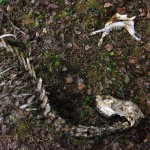Parfit’s Glass Tunnel
 In the Introduction to this project, I said:
In the Introduction to this project, I said:
It’s the strong – and I believe, irrational – hold that the idea of the self has over us, and particularly its role in motivating action, that led me to characterize it as the ‘phantom self’. Like the Phantom of the Opera, the self has a powerful voice that demands to be obeyed. Like an amputee’s phantom limb, it is a vividly felt presence – but there is nothing really there.
It is time to flesh out that characterization.
No contemporary philosopher – perhaps no philosopher ever, in the West – has done more to break the phantom’s grip than Derek Parfit. In Reasons and Persons, Parfit argues persuasively that, although we are strongly inclined to believe that our continued existence is “a deep further fact, distinct from physical and psychological continuity”, that belief is not true. He goes on to describe the difference this philosophical conclusion made to his own life.
Is the truth depressing? Some may find it so. But I find it liberating, and consoling. When I believed that my existence was such a further fact, I seemed imprisoned in myself. My life seemed like a glass tunnel, through which I was moving faster every year, and at the end of which there was darkness. When I changed my view, the walls of my glass tunnel disappeared. I now live in the open air. There is still a difference between my life and the lives of other people. But the difference is less. I am less concerned about the rest of my own life, and more concerned about the lives of others. (RP p 281) Continue reading “The Phantom Self”

 In the story
In the story  Roger Beethey shows up late, with a blonde. Elliot gives him a pleading look. “Relax,” says Beethey.
Roger Beethey shows up late, with a blonde. Elliot gives him a pleading look. “Relax,” says Beethey. Getting into the Institute turned out to be easy. Arriving in a crowd from the bus, he found the iid-controlled gate held open for him by a smiling girl. Security at that boundary is given low priority. The ‘free-campus’ tradition. Half-hidden in a big armchair in a departmental Reading Room – not his own department’s – he checks the messages on his phone. Nothing new that matters. He re-reads Elliot’s reply to EB, agreeing to meet before class. Elliot must be in his car by now, probably in slow traffic on the Expressway.
Getting into the Institute turned out to be easy. Arriving in a crowd from the bus, he found the iid-controlled gate held open for him by a smiling girl. Security at that boundary is given low priority. The ‘free-campus’ tradition. Half-hidden in a big armchair in a departmental Reading Room – not his own department’s – he checks the messages on his phone. Nothing new that matters. He re-reads Elliot’s reply to EB, agreeing to meet before class. Elliot must be in his car by now, probably in slow traffic on the Expressway. Instead of the motel on Bridgeport, as the other Elliot wanted, he checks into the Verdmont for what remains of the night. He owes himself that much. He is a bit surprised that his iid still opens doors. The other Elliot could have changed his code, which would have made his own implant useless. But the surprise vanishes when he thinks of what he would have done in the other’s place. Without a valid iid, he could hardly last a day in Waterloo without coming to the attention of the police. He has to eat, to sleep somewhere, and although he knows that resourceful denizens of the city’s underbelly do so without an iid, he cannot. He might, of course, approach the authorities for assistance, were it not that he fears publicity just as much as the other does. As the other Elliot said last night, the stikists could ‘get mileage’ out of this. That could set the itravel industry back ten years.
Instead of the motel on Bridgeport, as the other Elliot wanted, he checks into the Verdmont for what remains of the night. He owes himself that much. He is a bit surprised that his iid still opens doors. The other Elliot could have changed his code, which would have made his own implant useless. But the surprise vanishes when he thinks of what he would have done in the other’s place. Without a valid iid, he could hardly last a day in Waterloo without coming to the attention of the police. He has to eat, to sleep somewhere, and although he knows that resourceful denizens of the city’s underbelly do so without an iid, he cannot. He might, of course, approach the authorities for assistance, were it not that he fears publicity just as much as the other does. As the other Elliot said last night, the stikists could ‘get mileage’ out of this. That could set the itravel industry back ten years. Finally an email from Dalton, on the last possible day. With misgivings, Elliot opens it. Nothing at all in the body, just Dalton’s signature and the animated IGo logo scrolling endlessly across the page.
Finally an email from Dalton, on the last possible day. With misgivings, Elliot opens it. Nothing at all in the body, just Dalton’s signature and the animated IGo logo scrolling endlessly across the page. All that’s needed to make a case for radical reform of the idea of self is a thought-experiment with a clear and compelling outcome. However, the world is full of people who pay no attention to thought-experiments, however revealing they may be in exposing inconsistencies in everyday ideas, because thought-experiments aren’t ‘real’. These are people from Missouri, as the saying goes, who demand to be shown. And I have nothing to show, yet.
All that’s needed to make a case for radical reform of the idea of self is a thought-experiment with a clear and compelling outcome. However, the world is full of people who pay no attention to thought-experiments, however revealing they may be in exposing inconsistencies in everyday ideas, because thought-experiments aren’t ‘real’. These are people from Missouri, as the saying goes, who demand to be shown. And I have nothing to show, yet. In recent weeks, I have been devouring
In recent weeks, I have been devouring  This post is an overview of the Phantom Self project, as I conceive it at the outset. It presents an overall structure of my case for conceptual reform. It does not state the entire argument, as most supporting detail will be left to subsequent posts. It is a plan and a rough map, not the journey itself, in the course of which there will certainly be unscheduled detours.
This post is an overview of the Phantom Self project, as I conceive it at the outset. It presents an overall structure of my case for conceptual reform. It does not state the entire argument, as most supporting detail will be left to subsequent posts. It is a plan and a rough map, not the journey itself, in the course of which there will certainly be unscheduled detours. An exchange of letters between Ian Brown and Jean Vanier was published in the Globe and Mail of Feb. 21, 2009, under the headline, “
An exchange of letters between Ian Brown and Jean Vanier was published in the Globe and Mail of Feb. 21, 2009, under the headline, “